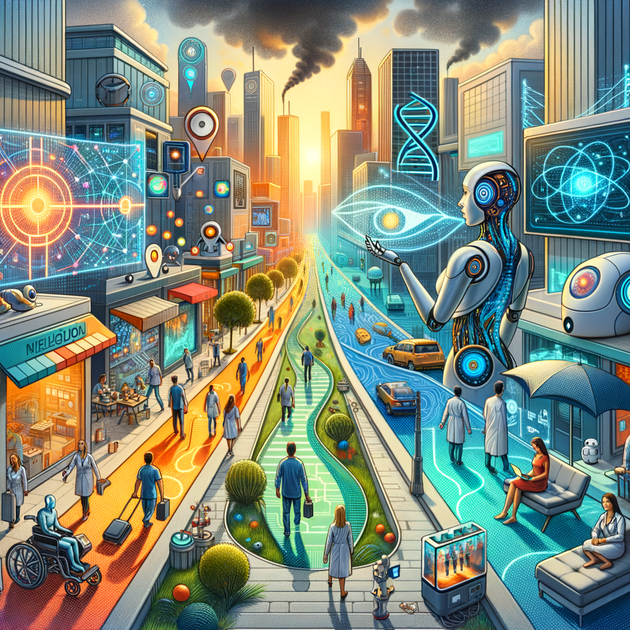How AI Is Shaping The Future: From Robocalls to Innovations In Healthcare
The rise of artificial intelligence (AI) has touched nearly every aspect of life as we know it. From **disrupting the way businesses operate** to **enhancing healthcare** services, AI’s reach is broad and transformative. One particularly contentious application of AI is its role in generating robocalls and robotexts. Recently, the Federal Communications Commission (FCC) has proposed new regulations aimed at curbing these AI-generated nuisances.
The Problem with AI-Generated Robocalls
Imagine this: you’re having a peaceful evening at home, and your phone rings. You answer it, only to hear a robotic voice on the other end pitching a too-good-to-be-true offer. Frustrating, right? AI has made it effortless for scammers and telemarketers to **automate robocalls and robotexts**, impacting millions of people globally.
Why Are AI-Generated Calls So Successful?
Their success lies in the sophisticated algorithms that can sift through countless numbers and personalize messages to improve interaction rates. These AI-driven systems are designed to be **incredibly efficient and scalable**, making it easy for bad actors to reach a larger audience with minimal effort.
FCC’s Regulatory Response
To combat this growing issue, the FCC has proposed regulations that aim to tighten the reins on AI-generated robocalls and robotexts. This move is seen as a positive step towards mitigating the negative impacts of AI when misused.
Key Proposals
- Enforcing stricter verification processes for outbound calls
- Imposing heavy fines on violators to deter unlawful activities
- Utilizing AI for call tracking and identification of spam patterns
These measures are designed to not only **limit the scourge of robocalls and robotexts** but also to employ AI as a tool for enforcement, turning the technology against those who misuse it.
AI’s Transformative Power in Healthcare
While the use of AI in generating robocalls has garnered attention for its negative implications, it’s important to recognize the profoundly positive impact AI is making in other fields. One such area is healthcare, where AI is driving significant innovations.
AI-Powered Diagnostics
In healthcare, AI is being utilized to assist in diagnostics, improving the accuracy and speed of identifying conditions. For instance, AI algorithms can analyze medical imaging much faster than traditional methods, providing doctors with precise diagnostic tools that enhance patient care.
Personalized Treatment Plans
AI also plays a critical role in personalizing treatment plans for patients. It can analyze vast amounts of data from electronic health records to determine the most effective treatments based on individual patient profiles.
The Ethics and Bias in AI: A Double-Edged Sword
As AI continues to permeate various industries, concerns around ethics and bias have surfaced. The same technology that powers self-driving cars and voice assistants can also manifest biases present in the data it was trained on.
The Challenge of Bias
AI systems can inadvertently perpetuate existing inequalities if not carefully monitored. This is especially true in fields like criminal justice, lending, and hiring practices.
Tackling AI Bias
Industry experts advocate for rigorous auditing of AI systems and more inclusive data sets to minimize biases. Transparency in AI decision-making processes is also crucial to ensure fairness and accountability.
AI in Business: Revolutionizing Operations
In business, AI is not just a buzzword; it’s a transformative force revolutionizing how companies operate. From optimizing supply chains to enhancing customer engagement, AI applications are diverse and impactful.
Enhancing Customer Service
AI-powered chatbots are enhancing customer service by providing instant responses to queries, thus improving customer satisfaction. These chatbots leverage **Natural Language Processing (NLP)** to understand and respond more accurately to customer needs.
Optimizing Operations
AI algorithms can predict demand, optimize inventory levels, and streamline logistics—ensuring that businesses operate more efficiently and cost-effectively. Predictive analytics powered by AI can provide businesses with insights that were previously unattainable.
The Road Ahead: Innovations and Challenges
As we look to the future, it’s clear that AI will continue to evolve, presenting new opportunities and challenges. While AI’s potential is immense, it is essential to address the ethical considerations, regulatory frameworks, and biases that come with it.
Engage with Us
We invite you to engage with us and share your thoughts. How do you see AI shaping the future? What innovations are you most excited about? **Join the conversation and let’s explore the future of AI together!**
